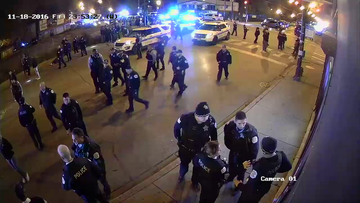
Kim Hawkins recently commented on From Car Chase to Confession: Manhunt In Sedro-Woolley (Part I). She wrote:
RWP, once again you bring the awesome content! [Thank you] I have a question! Any chance you may be able to get your hands on any of the footage or audio from the case of the NY officer who was just arrested for trying to have her estranged husband and her boyfriend's daughter murdered? I require the tea!
Answer: Maybe, but it'll take a while… and that’s if it works. Want to try?
This is my evaluation of what will likely happen if I try to obtain that footage or audio, written for the uninitiated. Let's begin.
The case Kim asked about is out of New York, whose access to public records statute is called the Freedom of Information Law, or "FOIL."
As in all states, FOIL grants a broad right of access to public records. Except when it doesn't. Let’s examine that more closely.
Section 87(2) of FOIL begins:
"Each agency shall, in accordance with its published rules, make available for public inspection and copying all records, except that such agency may deny access to records or portions thereof that:..." Uh oh.
Skipping a ways down brings us to (e)(i) - §87(2)(e)(i) in full, which allows an agency to deny access to:
“records compiled for law enforcement purposes and which, if disclosed, would interfere with law enforcement investigations or judicial proceedings.”
There are plenty of other exemptions, but §87(2)(e)(i) is the one that's most relevant to us. Because the arrest was recent and the "judicial proceeding" is only just getting underway, all case records are effectively insulated from disclosure.
But why not ask for records that wouldn't interfere with the case? Or try to argue that the release of video specifically wouldn’t interfere?
On its own that seems like a reasonable idea, particularly because of how FOIL treats all exemptions.
New York's Court of Appeals wrote about FOIL exemptions in Gould v. New York City Police Department [89 NY2d 267 (1996)]. There, the court wrote that "exemptions must be narrowly construed, with the burden resting on the agency to demonstrate that the requested material indeed qualifies for exemption." The court also held that "...to invoke one of the exemptions of §87(2), the agency must articulate 'particularized and specific justification' for not disclosing requested documents.”
Sounds good for my chances to get these records, right?
Don't get too excited yet.
Only three years later, in 1999, the Second Department decided Pittari v Pirro (258 AD2d 202, 696 NYS2d 167). In that case, they ruled that agencies were allowed to make "generic determinations” that in “particular kinds of enforcement proceedings, disclosure of particular kinds of investigatory records while a case is pending would generally ‘interfere with enforcement proceedings.’”
Following that decision, agencies continued their usual practice of denying requests for records that in any way related to upcoming or in-progress litigation, but they started doing so using nothing more than a generic recitation of §87(2)(e)(i).
Now, you should realize that agencies can do whatever they want. By that, I mean that they could have always issued that kind of generic denial. The big difference after Pittari was that it would hold up in court.
To bring this discussion back to a request for video of the officer's arrest, I am confident that a request for anything related to the case would be met with a generic blanket denial citing §87(2)(e)(i).
Fortunately, though, there is room for appeal. Because Pittari is no longer the end of the road.
In 2012 the Court of Appeals ruled in Lesher v. Hynes (19 NY3d 57, 945 NYS2d 214) that §87(2)(e)(i) doesn't apply to all records placed in an investigation file. Although the agency could identify the generic kinds of documents for which the exemption was claimed and the generic risks posed by disclosure of those specific categories of documents, the Court wrote that “…the agency must still fulfill its burden under §89(4)(b) to articulate a factual basis for the exemption” (Lesher, at 7). Hooray! (Sort of…)
That ruling reaffirmed the public’s right to access records compiled for law enforcement purposes until and unless the government articulates a factual basis for their exemption. They can and almost always do try to do that, but in a post-Lesher world you can duke it out in court — with a real possibility of winning.(1)
So this is how a request would likely pan out: Request the videos --> get a prompt acknowledgment --> some amount of time later receive a disappointingly brief letter containing a blanket denial and referencing §87(2)(e)(i) --> appeal --> the agency asserts particularized reasons and claims a whole lot of new exemptions, and probably still denies access.
Then what?
Here are the main options:
a) do nothing;
b) file a lawsuit against the agency; or
c) as the Lesher court reminds us: “[o]f course, Public Officers Law §87(2)(e)(i) ceases to apply after enforcement investigations and any ensuing judicial proceedings have run their course” (Lesher, at 8). In other words, wait.
So, tell me about this case. Got a link?
-RWP
(1) How that works, oversimplified: The agency and the requestor submit their arguments in writing, and the agency eventually produces the requested records to the judge, along with proposed redactions / withholdings. The judge then examines the records privately, considers everyone's arguments, and issues an appealable ruling based on their interpretation of the law as applied to your case.
